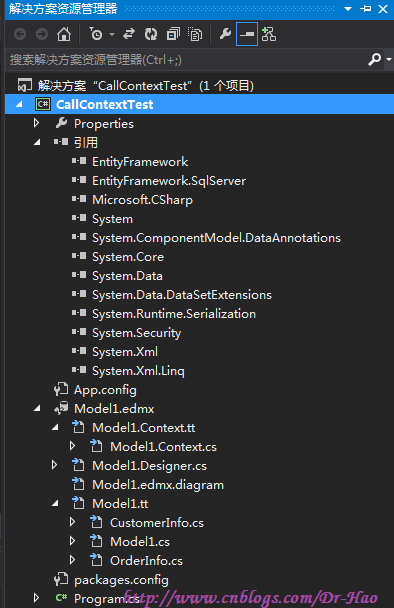Entity Framework Context上下文管理(CallContext 数据槽)
Context上下文管理
Q1:脏数据
Q2:一次逻辑操作中,会多次访问数据库,增加了数据库服务器的压力
>在一次逻辑操作中实现上下文实例唯一
方法一:单例模式:内存的爆炸式增长
在整个运行期间是静态的,保持加载对象不会被回收,所有跟踪的对象也都不会被回收
方式二:CallContext(线程数据槽):
1:线程独享的数据槽。2:集合结构 (web也可以使用HttpContext)
CallContext 类 (System.Runtime.Remoting.Messaging)_files 链接: http://pan.baidu.com/s/1c2LRbmo 密码: 52zp
对比使用EF与ADO.NET
优点:开发简单快捷,强大的模型设计,跨数据库支持
缺点:效率低(把EF操作转换为SQL语句)
1:使用EntityFramework Database First方式创建CustomerInfo表格数据映射
Entity Framework(EF的Database First方法) :http://www.cnblogs.com/Dr-Hao/p/5367147.html

2:新建ContextFactory.cs封装工厂类
using System; using System.Collections.Generic; using System.Data.Entity; using System.Linq; using System.Runtime.Remoting.Messaging; using System.Text; using System.Threading.Tasks; namespace CallContextTest { public class CallContextFactory { public static DbContext GetContext() { //通过CallContext数据槽,可以实现线程类实例唯一的功能 DbContext context = CallContext.GetData("context") as DbContext; if (context==null) { context = new MyFirstEFEntities(); CallContext.SetData("context",context); } //每次都新建上下文对象,在一次逻辑操作中,无法保证数据的正确性 //DbContext context = new MyFirstEFEntities(); return context; } } }

3:Program.cs 程序中的测试代码
using System; using System.Collections.Generic; using System.Data.Entity; using System.Linq; using System.Text; using System.Threading.Tasks; namespace CallContextTest { class Program { static void Main(string[] args) { Test1 test1 = new Test1(); test1.Add(); Test2 test2 = new Test2(); test2.Add(); DbContext context = CallContextFactory.GetContext(); var item = context.Set<CustomerInfo>().Find(1); Console.WriteLine(item.customerName); Console.ReadKey(); } } public class Test1 { public void Add() { DbContext context = CallContextFactory.GetContext(); var item = context.Set<CustomerInfo>().Find(1); item.customerName += "1"; } } public class Test2 { public void Add() { DbContext context = CallContextFactory.GetContext(); var item = context.Set<CustomerInfo>().Find(1); item.customerName += "2"; } } }
最后输出结果为 item.customerName+"12"; 这样在一次逻辑操作中,通过CallContext数据槽,可以实现线程类实例唯一的功能,保证数据的正确性。
code write the life, programe change the world





